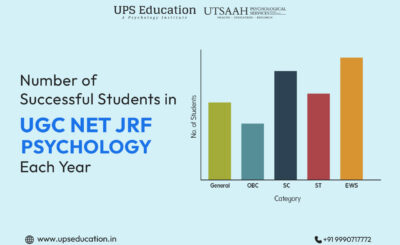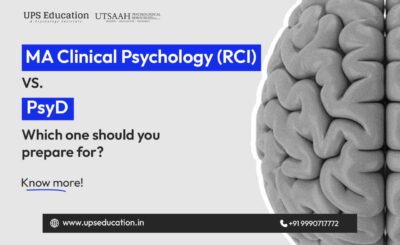The UGC NET exam is a gateway to academic and research opportunities in India. It is a national-level exam designed to test a candidate’s ability for a “Junior Research Fellowship (JRF)” award, appointment as an “Assistant Professor”, and “Admission into a PhD Program” in Indian colleges and universities. Clearing it leads to the aforementioned paths; however, candidates often get confused about which path to choose or which aligns best with their career goals.
In this article, we’ll take a closer look at each of these paths by the UGC NET Psychology Exam, see what they entail, how they differ, and which might be right for you.
Understanding the Options
Junior Research Fellowship (JRF): Overview
The Junior Research Fellowship (JRF) is among the most prestigious opportunities offered through the UGC NET and other national-level research examinations. It is ideal for psychology graduates who wish to build a strong foundation in research, data analysis, and academic exploration rather than stepping directly into teaching.
When a candidate qualifies for the JRF, they become eligible to receive financial assistance from the University Grants Commission (UGC) to pursue full-time research, often as part of a PhD program. The fellowship offers a monthly stipend of around ₹31,000 (plus HRA) for the first two years, which may increase upon promotion to the Senior Research Fellowship (SRF) stage based on satisfactory progress. The overall duration is up to five years.
Key Highlights
- Duration: 2 years as JRF, extendable up to 5 years (with SRF upgrade)
- Stipend: ₹31,000/month + HRA initially; higher after SRF promotion
- Eligibility: Postgraduate degree with at least 55% marks; age below 30 years (relaxations applicable)
- Ideal for: Candidates interested in research-based careers and academic growth
Below is a list of popular national-level JRF examinations in India:
| Exam | Conducting Body | Posts Offered | Frequency |
|---|---|---|---|
| UGC NET | NTA | JRF + Assistant Professor | Twice a year |
| CSIR NET | NTA on behalf of CSIR | JRF + Lectureship (Science Fields) | Twice a year |
| DBT JRF (BET, GAT-B) | Department of Biotechnology, Government of India | JRF in Biotechnology | Annually |
| ICMR JRF | PGIMER, Chandigarh | Medical Research Fellowship / PhD | Annually |
| CSIR JRF GATE | Respective CSIR Labs | JRF under CSIR projects | Annually |
| ICAR JRF | NTA | JRF for Agricultural Universities | Annually |
Progression and Evaluation
During the fellowship, candidates work under the supervision of approved faculty or researchers. Their progress is reviewed periodically by a committee (typically including the supervisor, head of department, and external examiner).
- If performance is satisfactory after two years, the candidate is promoted to Senior Research Fellow (SRF) for the next three years.
- If performance is unsatisfactory, an additional one-year extension may be granted to complete pending work.
Additional Benefits
- JRF-qualified candidates are exempt from PhD entrance exams in many universities.
- Their research work, if published, often adds significant value to their academic portfolio.
- Experience as a JRF is considered highly credible when applying for teaching or research roles.
Application Process
- Visit the official website of the conducting body (e.g., NTA for UGC NET).
- Complete the online application and upload necessary documents.
- Pay the prescribed fee and appear for the examination.
- Qualified candidates may need to undergo document verification or interview (varies by institution).
The JRF pathway is perfect for those who wish to dedicate their early academic years to research and scholarly development. It offers the best combination of funding, guidance, and academic exposure, preparing candidates for both a PhD and future academic positions.
Assistant Professorship: Teaching & Academia Path
The Assistant Professor role in psychology is an academic teaching position at colleges and universities. Clearing the UGC NET makes candidates eligible to apply for these positions, which primarily focus on teaching, mentoring, and academic service, while research is often encouraged but not mandatory initially.
This path is ideal for candidates who are interested in a classroom career, enjoy teaching, and want to contribute to higher education, sometimes alongside research projects. Unlike the JRF, which emphasizes research, the Assistant Professorship focuses more on curriculum delivery, student engagement, and departmental responsibilities.
Key Points:
- Eligibility: Master’s degree in Psychology with NET qualification (UGC NET/JRF)
- Ideal for: Those who want to focus on teaching, mentoring students, and building an academic career
- Salary: Pay scales follow UGC guidelines (starting around ₹57,700–₹1,82,400 per month as per the 7th Pay Commission for entry-level Assistant Professors)
- Job Role: Teaching undergraduate and postgraduate students, designing course material, supervising projects, departmental administration and optional research.
Pathway:
- Qualify UGC NET in the relevant subject.
- Apply for Assistant Professor positions at universities and colleges.
- Enhance your profile with publications, workshops, and teaching experience.
If your goal is academia and mentoring students, becoming an Assistant Professor is a direct route. Pairing it with a PhD later strengthens your prospects for promotions and higher academic positions.
PhD in Psychology: Research & Specialization Path
A PhD represents the highest level of academic qualification in the field. It focuses on original research, theory building, and scholarly contribution, and is often pursued by those who want to establish themselves as researchers, academicians, or subject-matter experts.
Candidates with a JRF often continue their fellowship into a PhD program, while others may pursue a PhD after qualifying for NET (without JRF) or through university-specific entrance exams. Typically lasting 3–5 years, a PhD involves coursework, proposal development, data collection, thesis writing, and defence.
While it demands time, patience and intellectual discipline, completing a PhD significantly enhances one’s career scope, enabling eligibility for professorships, research positions, and senior-level roles in institutions, think tanks, and policy organizations.
This path is best suited for those who are deeply curious, academically motivated, and ready to contribute to the discipline at an advanced level.
Key Highlights
- Duration: Minimum 3 years, usually extendable up to 5–6 years depending on research progress.
- Eligibility: Master’s degree in Psychology (55% aggregate; 50% for reserved categories) and UGC NET JRF followed by an interview.
- Structure:
- Coursework on research methods, statistics, and advanced topics
- Proposal defense and ethics approval
- Independent research under faculty supervision
- Thesis submission and viva voce
- Focus: Advanced research, publications, and dissertation work.
Funding Options
- With JRF: Candidates receive a monthly fellowship (~₹31,000–₹35,000 initially) and HRA.
- Without JRF: Some universities offer institutional fellowships or teaching assistantships; others may require self-funding or part-time registration while working.
Career Outcomes
A PhD opens doors to multiple professional pathways:
- Academic Roles: Assistant Professor, Associate Professor, or Professor
- Research Roles: Principal Investigator, Research Scientist, or Consultant
- Applied Fields: Policy research, mental health program evaluation, organizational consulting, or NGO sector work
Key Takeaway
A PhD is ideal for those who want to make a long-term impact on the discipline — whether by contributing to research, teaching at the highest levels, or influencing policy and practice through evidence-based insights. It’s a rigorous but rewarding journey that turns curiosity into contribution.
ALSO READ: CUET UG Psychology | UPS Education
How to Choose Between JRF, Assistant Professorship, and PhD
Choosing between JRF, Assistant Professorship, and a PhD Path depends on your career goals, academic interests, and the professional direction you envision for yourself. While all three are interconnected, each offers a distinct experience and purpose within academia.
- If you enjoy exploring questions, collecting data, and building new insights, JRF is your gateway.
- If you love teaching, guiding students, and working in classrooms, an Assistant Professorship is your path.
- If you seek deep academic specialization and wish to contribute original knowledge, a PhD should be your choice.
| Aspect | Junior Research Fellowship (JRF) | Assistant Professorship | PhD Path |
|---|---|---|---|
| Primary Focus | Research training, data analysis, and academic exploration | Teaching, mentoring, and academic service | Advanced research, theory building, and specialization |
| Best For | Candidates aiming for a PhD with financial support and mentorship | Those who wish to begin teaching early and grow in academia | Individuals committed to long-term research or scholarly leadership |
| Duration | 2 years (as JRF) + 3 years (as SRF, if upgraded) | Permanent or contractual (as per UGC norms) | 3–5 years on average |
| Financial Support | ₹31,000–₹35,000/month + HRA (fellowship-based) | Regular salary (starting ₹57,700+ as per 7th Pay Commission) | Depends on fellowship (JRF/institutional/part-time/self-funded) |
| Career Growth | Leads to PhD, postdoctoral work, or research roles | Leads to higher teaching positions and administrative roles (PhD required for promotion) | Leads to senior research, academic, and policy-making roles |
| Entry Route | Qualify UGC NET with JRF eligibility | Qualify UGC NET (JRF optional) | Qualify NET/JRF or university-level entrance + interview |
| Drawbacks | Limited teaching exposure during fellowship | Limited research funding initially | Demands long-term commitment, patience, and perseverance |
All three paths, JRF, Assistant Professorship, and PhD, complement one another. Many begin with JRF, transition into a PhD, and eventually enter teaching or research leadership roles. What matters most is identifying where you want to start and what motivates you — curiosity, communication, or contribution.
UGC NET Psychology Cutoff Trends
Understanding the cutoff trends is essential for gauging how competitive the exam is and setting realistic targets. The cutoffs vary every cycle depending on factors such as the difficulty level, number of candidates, and available fellowships.
Below are the recent cutoff trends:
| Cycle | Category | JRF Cutoff | NET Cutoff |
|---|---|---|---|
| June 2018 | General | 67.67 | 56 |
| OBC-NCL | 60 | 49.33 | |
| EWS | – | – | |
| SC | 56 | 46.67 | |
| ST | 58.67 | 48 | |
| December 2018 | General | 62.67 | 56 |
| OBC | 58.67 | 50.67 | |
| EWS | – | – | |
| SC | 57.33 | 47.33 | |
| ST | 56 | 46 |
| Cycle | Category | JRF Cutoff | NET Cutoff |
|---|---|---|---|
| June 2019 | General | 65.33 | 57.33 |
| OBC-NCL | 60 | 50.67 | |
| EWS | 59.33 | 48.67 | |
| SC | 55.33 | 47.33 | |
| ST | 56.67 | 47.33 | |
| December 2019 | General | 64.67 | 56 |
| OBC | 60.67 | 50 | |
| EWS | 59.33 | 50 | |
| SC | 60.67 | 47.33 | |
| ST | 60.67 | 46 |
| Cycle | Category | JRF Cutoff | NET Cutoff |
|---|---|---|---|
| June 2022 | General | 216 | 196 |
| OBC-NCL | 200 | 174 | |
| EWS | 200 | 174 | |
| SC | 184 | 162 | |
| ST | 178 | 158 | |
| December 2022 | General | 236 | 210 |
| OBC | 220 | 188 | |
| EWS | 224 | 190 | |
| SC | 214 | 172 | |
| ST | 198 | 170 |
| Cycle | Category | JRF Cutoff | NET Cutoff |
|---|---|---|---|
| June 2023 | General | 216 | 194 |
| OBC-NCL | 200 | 176 | |
| EWS | 206 | 176 | |
| SC | 190 | 162 | |
| ST | 184 | 156 | |
| December 2023 | General | 190 | 216 |
| OBC | 170 | 200 | |
| EWS | 172 | 204 | |
| SC | 156 | 188 | |
| ST | 156 | 188 |
ALSO READ: NIMHANS Clinical Psychology Cut-off Trends | UPS Education
Conclusion
Choosing between JRF, Assistant Professorship, and PhD requires clarity about your interests, career goals, and readiness for long-term commitment. By understanding each option and its implications, psychology candidates can make informed decisions, And no matter which route you choose, qualifying for UGC NET Psychology already places you among a select group of scholars prepared to advance both the science and practice of psychology in India.
FAQs
Q1. What is the difference between UGC NET and JRF?
UGC NET qualifies candidates for teaching (Assistant Professor), while JRF qualification additionally grants a research fellowship for pursuing a PhD with financial support.
Q2. Can I apply for both JRF and Assistant Professor through UGC NET Psychology?
Yes. The same exam determines eligibility for both. Those who meet the higher cutoff qualify for JRF; others may still be eligible for Assistant Professorship.
Q3. Does qualifying for JRF mean automatic PhD admission?
Not automatically. However, JRF-qualified candidates are exempt from entrance exams in many universities and receive priority consideration during interviews.
Q4. Is a PhD mandatory for becoming an Assistant Professor?
As per current UGC guidelines, qualifying UGC NET is sufficient for entry-level Assistant Professor posts. However, a PhD is essential for promotions to higher academic ranks.
Q5. What is the validity period of the UGC NET JRF award?
The JRF award is valid for three years from the date of issue, during which the candidate must secure admission to a PhD program.






